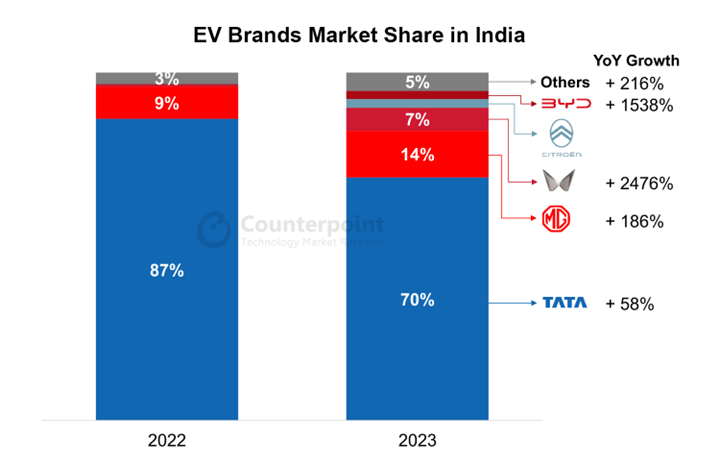When the world’s two most powerful and influential business tycoons join hands, something really enormous is supposed to happen. Isn’t it? We are talking about Elon Musk and Mukesh Ambani. Their respective companies, Tesla and Reliance, are reportedly in discussions for a potential joint venture to establish an electric vehicle (EV) manufacturing facility in India. If this groundbreaking partnership comes to fruition, it will redefine the automotive industry not only in India but globally.
Insiders familiar with the matter have revealed that discussions between Tesla and Reliance have been underway for over a month at the early stages.
It’s important to highlight that Reliance Industries Limited (RIL) is not entering the automotive sector solely as a business expansion strategy. Instead, RIL’s primary objective in partnering with Tesla is to spearhead the development of electric vehicle capabilities in India, its homegrown market.
Through this partnership, RIL aims to play a pivotal role in shaping the future of electric mobility in India. The goal is to contribute significantly to the growth and adoption of electric vehicles, while simultaneously driving sustainability and technological progress in the automotive industry.
“India should have electric cars just like every other country. It’s a natural progression to provide Tesla electric vehicles in India,” said Elon Musk.
New Policy to Boost EV Manufacturing in India
The Ministry of Heavy Industries (MHI) recently unveiled a new policy aimed at accelerating electric vehicle manufacturing in India by enticing global players like Tesla, BYD, BMW, and Mercedes-Benz. Under this policy, companies committing to invest at least $500 million (Rs 4,150 crore) in setting up a manufacturing plant within three years will benefit from reduced import taxes on certain EVs.
The policy proposes a significant reduction in import duties for interested global EV manufacturers, lowering the tariff to 15% from the current 70% or 100% for vehicles with a CIF (cost, insurance, and freight) value of $35,000 and above. This reduced duty structure will be applicable for a period of five years from the date of issuance of the government’s approval letter. Notably, this proposed duty structure aligns closely with the demands previously made by Tesla, led by Elon Musk, during discussions with the Indian government.
Progress on Tesla’s Entry into India
Media reports suggest that Maharashtra and Gujarat have offered appealing land proposals to Tesla for establishing its EV manufacturing facility. Simultaneously, discussions with the Telangana government are reportedly progressing towards a similar arrangement with the EV giant. The proposed facility, anticipated to attract investments ranging from $2 billion to $3 billion, is aimed at meeting the demand for Tesla’s electric vehicles both in India and internationally.
Tesla has also started producing right-hand drive (RHD) vehicles at its facility in Germany. These vehicles are intended for export to India later this year, indicating Tesla’s advancement toward potential entry into the world’s third-largest automotive market.
EV Market in India
The rising demand for electric vehicles in India is evident from the significant growth observed in 2023. Despite the 10% YoY growth in passenger vehicle (PV) sales in the country, the sales of electric cars nearly doubled, indicating a significant shift towards electric mobility.
This surge in EV adoption in India can be attributed to various factors, including increasing interest among urban consumers, government initiatives promoting electric mobility, ongoing infrastructure development, and heightened concerns about climate change. However, EVs accounted for only 2% of the overall PV sales in India in 2023, according to Counterpoint Research.
In 2023, Tata Motors maintained a dominant position in India’s EV market, capturing more than two-thirds of the market share. However, the brand has witnessed a notable decline of 17 percentage points in its market share within a single year due to stiff competition from Mahindra & Mahindra and BYD.

The demand for EV cars is poised to skyrocket in the next five years as more companies are betting big on India, mainly due to its status as the world’s most populous country. There is a big window of opportunity for new players to establish themselves and capitalize on this growing EV market.
In conclusion, the proposed joint venture between Tesla and Reliance, coupled with the government’s supportive policies to boost EV manufacturing, signifies a transformative shift in India’s automotive sector. The entry of Reliance and Tesla into India’s EV market will undoubtedly give all competitors a run for their money. With major players committed to investing in local manufacturing, the stage is set for rapid growth and innovation in electric mobility.
Are you excited about the potential impact of Tesla and Reliance’s collaboration on India’s electric vehicle market? Let us know in the comment section below!

